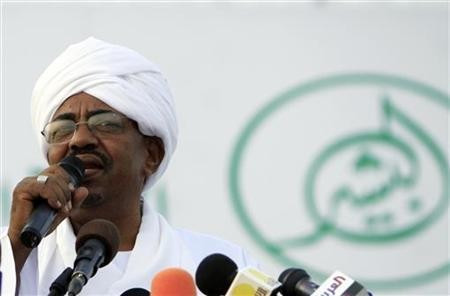US opposes the travels of Sudan's President Bashir – wanted by the ICC
US embassy in Khartoum reacts as Saudi Arabia invites Bashir to attend summit.

The US opposes the travels of Sudan's president Omar al-Bashir, who is wanted by the International Criminal Court (ICC) over alleged crimes against humanity including genocide. The US embassy in Sudan's capital Khartoum made the remarks hours after Saudi Arabia invited Bashir to attend a summit this weekend (20/21 May).
US President Donald Trump and leaders from the Muslim world have also been invited.
It is not clear yet whether Bashir will attend.
"In response to rumors recently circulating in the media, US Embassy Khartoum reiterates that the United States has made its position with respect to Sudanese President Omar al-Bashir's travel clear.
"We oppose invitations, facilitation, or support for travel by any person subject to outstanding International Criminal Court (ICC) arrest warrants, including President Bashir," the embassy said in a statement published on its Facebook page.
Bashir, who has been the president of Sudan since 1989, is wanted for alleged crimes committed in the region of Darfur, where at least 300,000 people have been killed since a conflict erupted in 2003.
He has always rejected the charges and refuses to stand trial as his country does not recognise the ICC's jurisdiction.
Both the US and Saudi Arabia are not signatories of the Rome Statute, the treaty that established the ICC in 2002.
Last year, Sudan was accused of using chemical weapons against civilians in Darfur. The country is also accused of marginalising non-Arab populations in the Blue Nile and South Kordofan regions, where conflicts are ongoing.
The European Union imposed an arms embargo on Sudan in 1994.
The US imposed sanctions on Sudan in the 1990s, after accusing it of supporting terrorism.
"There has been no change to Sudan's inclusion on the United States' State Sponsor of Terrorism list (SSTL). We have been quite clear with the Government of Sudan on the steps that need to be taken for us to consider delisting, as well as what would be required to make progress in easing economic sanctions," the embassy said, in reference to the sanctions.
In January, then US President Barack Obama eased sanctions on Sudan, citing improvement of humanitarian access and a reduction of internal violence.
However, the country is now among the six Muslim-majority countries targeted by a temporary visa ban imposed by the Trump administration.
Sudan is an ally of the Saudi Kingdom and is part of the Saudi-led coalition in Yemen.
In March, Jordan faced pressure by rights groups to arrest Bashir, who was in the Middle Eastern country to attend the Arab Summit.
In 2015, South Africa was strongly criticised for failing to arrest Bashir when he visited the country for an African Union summit. South Africa later announced it would leave the ICC on grounds of "incompatibility".
The Embassy of Sudan in London has not replied to a request for a comment on the remarks made by the US embassy in Khartoum at the time of publication.
© Copyright IBTimes 2025. All rights reserved.






















